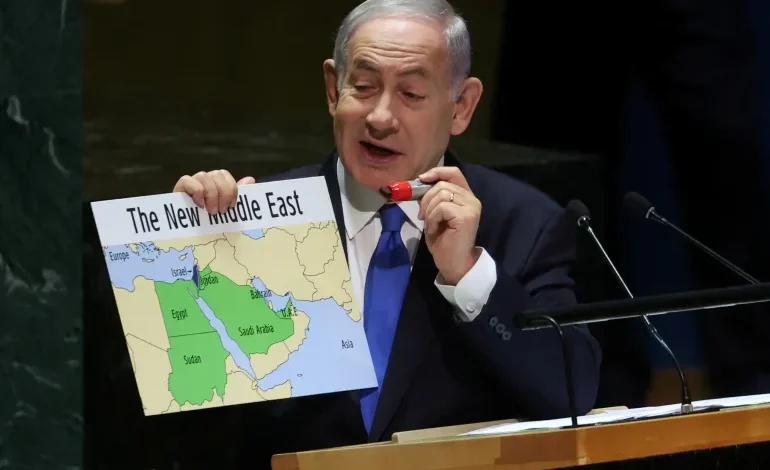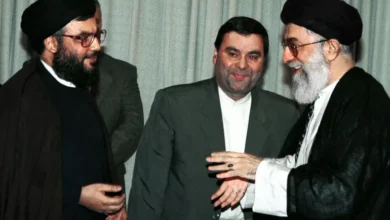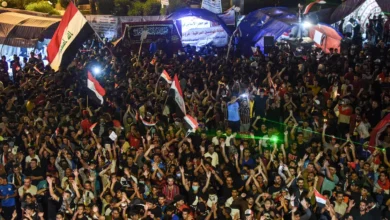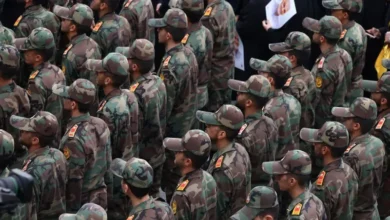Palestinians must not have veto over Arab-Israel deals, Netanyahu tells UN

Israeli Prime Minister Benjamin Netanyahu has hailed recent so-called “normalisation” deals between Israel and Arab states, stressing that Palestinians must not have “veto” over such agreements.
Speaking to the United Nations General Assembly on Friday morning, Netanyahu lauded the prospect of formal relations between Israel and Saudi Arabia, underscoring the United States’s role in efforts to broker a pact between the two countries.The Israeli prime minister also condemned the Iranian government and called on the international community to take a more stern position against Tehran.
Here, Al Jazeera looks at five key takeaways from Netanyahu’s address:
Says Palestinians must not have veto over ‘normalisation’
Netanyahu outlined what he called his vision for “peace” in the Middle East, in which Arab states would embrace Israel regardless of the Palestinian issue.
“I’ve long sought to make peace with the Palestinians. But I also believe that we must not give the Palestinians a veto over new peace treaties with Arab states,” he said.
“The Palestinians could greatly benefit from a broader peace. They should be part of that process, but they should not have a veto over the process.”
Few Arab states have recognised Israel since its establishment in 1948, but former US President Donald Trump’s administration helped secure agreements to establish relations between Israel and the United Arab Emirates, Bahrain and Morocco in 2020.Holds Middle East maps without Palestine
Despite his claims of pushing for peace with Palestinians, Netanyahu held up two maps of the Middle East with Israel highlighted in blue.
Both maps showed the occupied Palestinian territories – the West Bank and Gaza – as well as Syria’s occupied Golan Heights as being part of Israel.
The Israeli prime minister, who has a history of using props and red markers at the UNGA, employed the maps to emphasise Israel’s growing relations with neighbouring Arab countries.
Netanyahu is presiding over one of the most right-wing governments in the history of Israel, which has been intensifying violence and home demolitions against Palestinians while expanding illegal settlements in the occupied West Bank.
But on Friday, Netanyahu portrayed Israel as a peace-seeking nation, saying that “Palestinians must stop spewing Jew-hatred and finally reconcile themselves to the Jewish state.”
The tone of the speech was welcomed by a source close to Netanyahu’s far-right national security minister, Itamar Ben-Gvir. “If it stays in line with the speech – we are completely with him,” the source told Israel’s N12 News. “If in practice they start engaging in concessions and infringing of sovereignty, it is a sign that [Israeli opposition leader Benny] Gantz will come in. We will not allow peace… in exchange for infringement of sovereignty.”
Lauds potential deal with Saudi Arabia
Most of the Israeli prime minister’s speech revolved around Israeli-Arab rapprochement, including a potential normalisation deal with Saudi Arabia.
Unofficial ties between Israel and the Gulf kingdom have been growing for years, but the Israeli prime minister argued on Friday that a formal diplomatic agreement would be transformative for the region.
“Peace between Israel and Saudi Arabia will truly create a new Middle East,” Netanyahu said.
“Such a peace will go a long way to ending the Arab-Israeli conflict. It will encourage other Arab states to normalise their relations with Israel,” he continued.
“It will enhance the prospects of peace with the Palestinians. It will encourage a broader reconciliation between Judaism and Islam, between Jerusalem and Mecca.”
When asked about the prospects of normalising ties to Israel, Saudi Arabia had previously said it was sticking by the Arab Peace Initiative.
However, Saudi Crown Prince Mohammed bin Salman – the country’s de facto leader, better known as MBS – confirmed earlier this week that the kingdom is nearing a US-backed deal with Israel. “Every day, we get closer,” he told Fox News.
Palestinian officials have condemned previous Arab normalisation deals with Israel as “a stab in the back of the Palestinian cause and the Palestinian people”.










